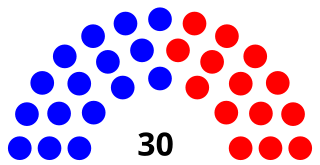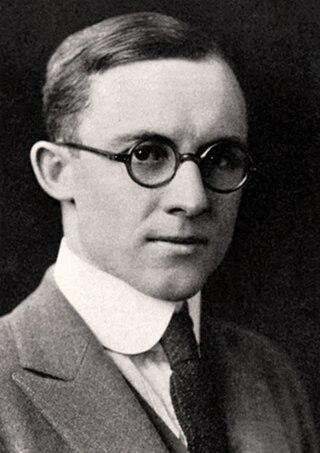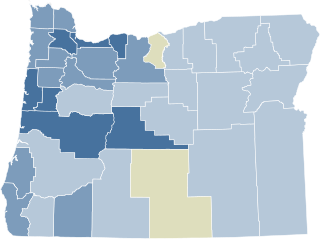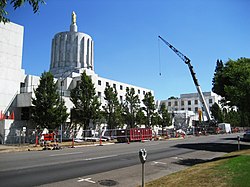Oregon has registered domestic partnerships between same-sex couples since 2008 and has expanded the law to begin registering partnerships between opposite-sex couples in 2024.

The Oregon Legislative Assembly is the state legislature for the U.S. state of Oregon. The Legislative Assembly is bicameral, consisting of an upper and lower house: the Senate, whose 30 members are elected to serve four-year terms; and the House of Representatives, with 60 members elected to two-year terms. There are no term limits for either house in the Legislative Assembly.
Term limits legislation – term limits for state and federal office-holders – has been a recurring political issue in the U.S. state of Oregon since 1992. In that year's general election, Oregon voters approved Ballot Measure 3, an initiative that enacted term limits for representatives in both houses of the United States Congress and the Oregon Legislative Assembly, and statewide officeholders. It has been described as the strictest term limits law in the country.

Bruce Starr is an American politician and businessman in Oregon. A Republican, he served two terms in the Oregon House of Representatives before winning election to the Oregon State Senate in 2002. There he joined his father Senator Charles Starr and they became the first father-son team to serve at the same time in Oregon's Senate. Bruce had previously been a member of the Hillsboro City Council, and was re-elected to the Senate in 2006 and 2010, but lost a bid in 2012 to be the Oregon Labor Commissioner.
Ballot Measure 25 of 2002 increased Oregon's minimum wage from $6.50 to $6.90 per hour and required an annual increase to compensate for inflation in future years. Inflation is measured by the consumer price index. As of 2015, the minimum wage in Oregon is $9.25 an hour. The measure was approved in the November 5, 2002 general election with 645,016 votes in favor, 611,658 votes against.Itemized Measure Listings, Measure 25 page 17 The measure was placed on the ballot as a result of initiative petition.

The 75th Oregon Legislative Assembly convened beginning on January 12, 2009, for its biennial regular session. All of the 60 seats in the House of Representatives and half of the 30 seats in the State Senate were up for election in 2008; the general election for those seats took place on November 4.
The Public Commission on the Oregon Legislature (PCOL) was a group of 30 citizens in the U.S. state of Oregon charged with developing recommendations on how to improve the Oregon Legislative Assembly. The 2005 session of the legislature established the commission with Senate Bill 1084. The bill, which declared an emergency, took effect upon its passage, when it was signed by Governor Ted Kulongoski on July 29, 2005.
Electoral reform in Oregon refers to efforts to change election and voting laws in the West Coast state of Oregon.

The 76th Oregon Legislative Assembly convened beginning on January 11, 2011, for the first of its two regular sessions. All 60 seats of the House of Representatives and 16 of the 30 state senate seats were up for election in 2010. The general election for those seats took place on November 2. The Democrats retained the majority in the senate, but lost six seats in the house, leading to an even split (30-30) between Democrats and Republicans. The governor of Oregon during the session was John Kitzhaber, a Democrat, who was elected to a third term in 2010 following an eight-year absence from public office.
The 72nd Oregon Legislative Assembly convened in January 2003 for its regular session, which on August 8 of that year surpassed the 1993 session as the longest in the U.S. state of Oregon's history. In the senate, which was evenly divided between 15 Democrats and 15 Republicans, Democratic President Peter Courtney and Republican President Pro Tempore Lenn Hannon were praised by The Oregonian for managing to avoid partisan gridlock. The House was composed of 35 Republicans and 25 Democrats.

Tim Knopp is an American Republican politician from Oregon. He is a member of the Oregon State Senate and served as the senate minority leader from 2021 to 2024. He previously served as a member of the Oregon House of Representatives from 1999 to 2005.
Roger Edward Martin was an American businessman, state legislator, and lobbyist from Oregon. He was an electric equipment sales executive with Martin Electric and served six terms in the Oregon House of Representatives. In 1978, Martin ran for governor of Oregon, but lost to Victor Atiyeh in the Republican primary. Following the 1978 election, Martin became a lobbyist at the Oregon State Capitol.

Jay Hollister Upton was an American politician and attorney from the state of Oregon. He was a conservative Republican who served two years in the Oregon House of Representatives; and later, fourteen years in the Oregon State Senate. In the senate, Upton represented a large rural district in eastern Oregon. He served as President of the Oregon Senate during the 1923 legislative session. Upton ran for Governor of Oregon and for the United States Congress from Oregon's 2nd congressional district, but lost both of those elections.

Denton Graves Burdick was an American politician and attorney from the state of Oregon. He was a Republican who served fourteen years in the Oregon House of Representatives, where he represented a large rural district in eastern Oregon. He served as Speaker of the Oregon House of Representatives during the 1925 legislative session. At the time he was elected speaker, he was the youngest person in Oregon history to serve in that position.

Oregon's Emergency Board is a statutory legislative committee composed of members of both houses of the Oregon Legislative Assembly. It has broad powers to allocate general fund resources, lottery revenue, and other state funds for unanticipated government requirements when the state legislature is not in session. The board can authorize an agency to overspend its approved budget or approve a new budget amount for specific agency tasks. It can also authorize the transfers of funds between agencies or budget accounts. The Emergency Board is jointly chaired by the President of the Oregon Senate and the Speaker of the Oregon House of Representatives.

The 80th Oregon Legislative Assembly convened for its first of two regular sessions on January 22, 2019, and met for three special sessions, the last of which concluded on December 21, 2020.

The 81st Oregon Legislative Assembly was the legislative session of the Oregon Legislative Assembly that convened on January 11, 2021 and adjourned June 26th. Its even-year short session of 35 days convened on February 1, 2022 and adjourned sine die on March 4, 2022.

Brady Leonard Adams was an American politician and banker from Grants Pass. He served eight years in the Oregon State Senate from 1993 through 2000. Adams was a conservative Republican who represented two Southern Oregon counties in the state senate. He was President of the Oregon State Senate during the 1997 and 1999 legislative sessions. During his time in the legislature, Adams was known for his ability to work with the state's Democratic governor as well as his peers in the state legislature. Over the years, he also served on the board of directors for more than 20 non-profit organizations.

Oregon Ballot Measure 113, the Exclusion from Re-election for Legislative Absenteeism Initiative, was approved by Oregon voters in the 2022 Oregon elections. Measure 113 amended the Constitution of Oregon to provided that members of the Oregon Legislature with ten unexcused absences from floor sessions are disqualified from serving in the legislature following their current term. It is codified as Article IV, Section 15 of the Oregon Constitution.

The 82nd Oregon Legislative Assembly is the current session of the Oregon Legislature. It began January 9, 2023.



















